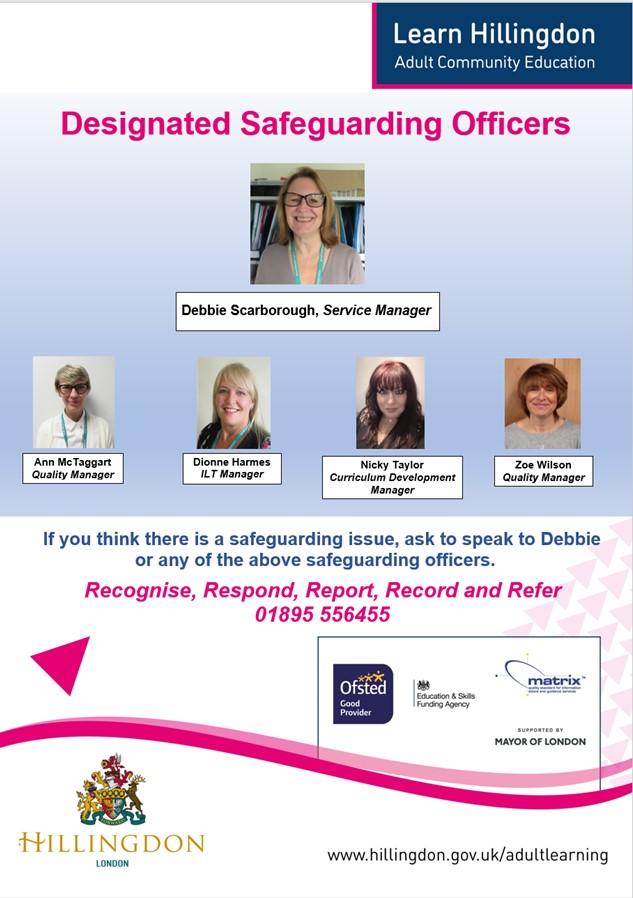Main content blocks
Section outline
-
Learn Hillingdon - Adult Community Education is fully committed to ensuring that the needs of all learners are at the centre of everything we do. We will strive to ensure that all learners and staff work and learn in a safe and supportive environment. Personal safety is essential for effective and successful learning and can only be achieved in an environment which promotes well-being and security for everyone, especially those who may be vulnerable. We will ensure we are fully compliant with all relevant legislation; undertake appropriate checks; combat bullying, harassment and discrimination; and ensure that all its staff and volunteers are appropriately trained.
Learn Hillingdon also supports the Prevent Programme. Prevent is the UK Government's counter-terrorism strategy which aims to stop people being drawn into, or supporting, terrorism. All staff who work with young people or vulnerable adults have a duty to respond and report immediately any signs of harm, abuse or extremism that are recognised or disclosed.
If you as a learner or staff member recognise anything that you consider might risk your or anybody else's safety, you are strongly encouraged to report it to a Designated Safeguarding Officer as soon as possible.

-
Prevent is the UK government's counter-terrorism strategy which aims to stop people being drawn into or supporting terrorism. Click the link and document below to find out more and do the quiz to test your knowledge.
-
This website reinforces key Prevent messages, how to spot the signs, what support is available, and includes some real stories of people they have helped.
-
Report concerns - Are you worried about someone? Maybe a family member? Seen something in your area or community that worries you?
Report terrorist or extremist content online – Action Counters Terrorism (campaign.gov.uk)
You can use this website to report or get more information.
Or ask to speak to one of our Safeguarding officers either in centre or over the phone 01895 556455
-
At Learn Hillingdon, the safety and welfare of staff and learners is very important to us. A full copy of our Health and Safety policy is available on the Policies page on Moodle. Click the links below for more information and to test your health and safety knowledge.
-
Online safety is very important, whether you're at home, at work or studying. For this reason, we have ICT Acceptable Usage and Wifi policies. Please see the Policies page on Moodle and click the links below for more information or to test your knowledge with a quiz.
-
The Data Protection Act 2018 regulates the processing of personal data. It requires that
organisations process your personal data transparently and in line with good
information handling rules. -
The fundamental British values of democracy, rule of law, individual liberty, mutual respect and tolerance for those with different faiths and beliefs are actively promoted at Hillingdon Adult Learning
-
All learners should be respected regarded of their race or religion, sexual orientation or dissability. If any learner mentions they have been a victim of an incident/attack there are some resources below that might provide them with advice on what to do.
-
Violence against women
Violence against women – particularly intimate partner violence and sexual violence – is a major public health problem and a violation of women's human rights.
- Estimates published by WHO indicate that globally about 1 in 3 (30%) of women worldwide have been subjected to either physical and/or sexual intimate partner violence or non-partner sexual violence in their lifetime.
- Most of this violence is intimate partner violence. Worldwide, almost one third (27%) of women aged 15-49 years who have been in a relationship report that they have been subjected to some form of physical and/or sexual violence by their intimate partner.
- Violence can negatively affect women’s physical, mental, sexual, and reproductive health, and may increase the risk of acquiring HIV in some settings.
- Violence against women is preventable. The health sector has an important role to play to provide comprehensive health care to women subjected to violence, and as an entry point for referring women to other support services they may need.
The links below provides some useful facts and information: -
How do you know that the information you are receiving is real and correct?
There are many websites available for you to check the facts.
-
Always a good way to help and we all want to be doing something right now. But how do you know it is a ‘real’ charity? Sadly during this difficult time, fraud will also be on the rise as fraudsters see a way of getting their hands on your money. So use the website to check out your chosen charity.
Search the charity register - GOV.UK (www.gov.uk)